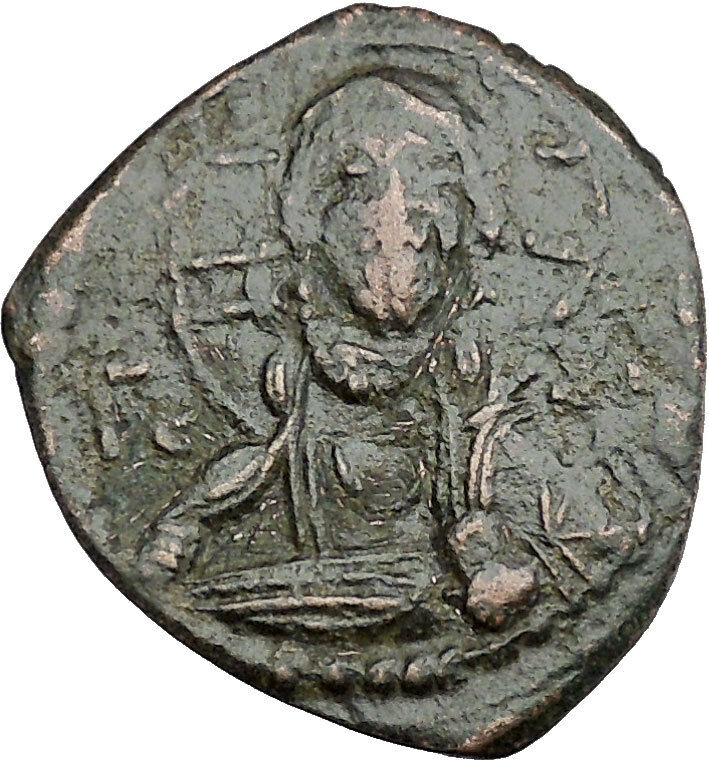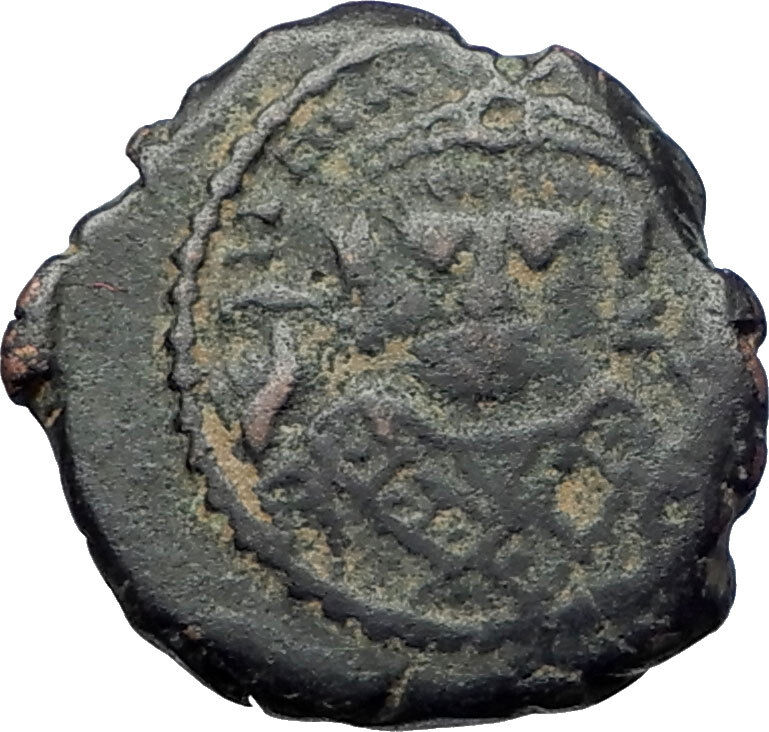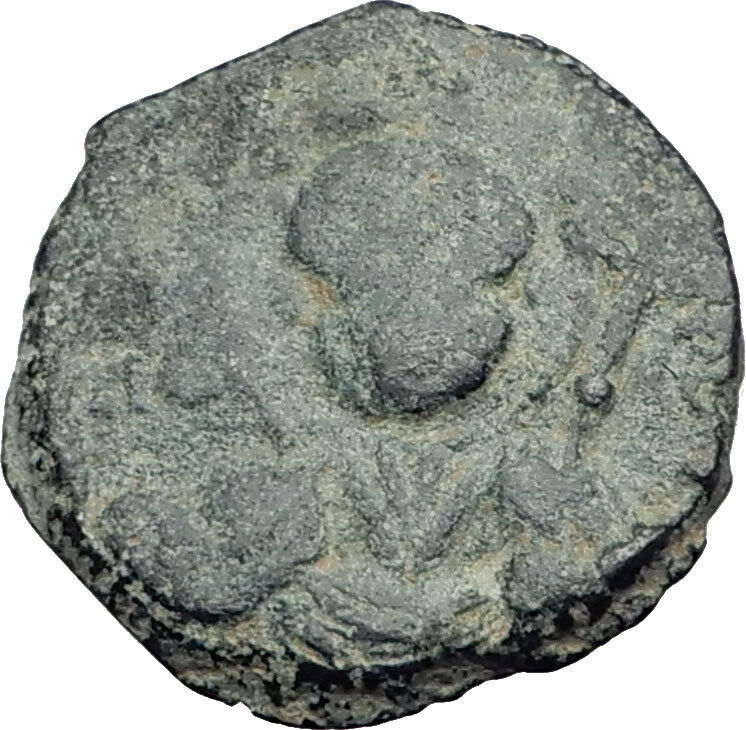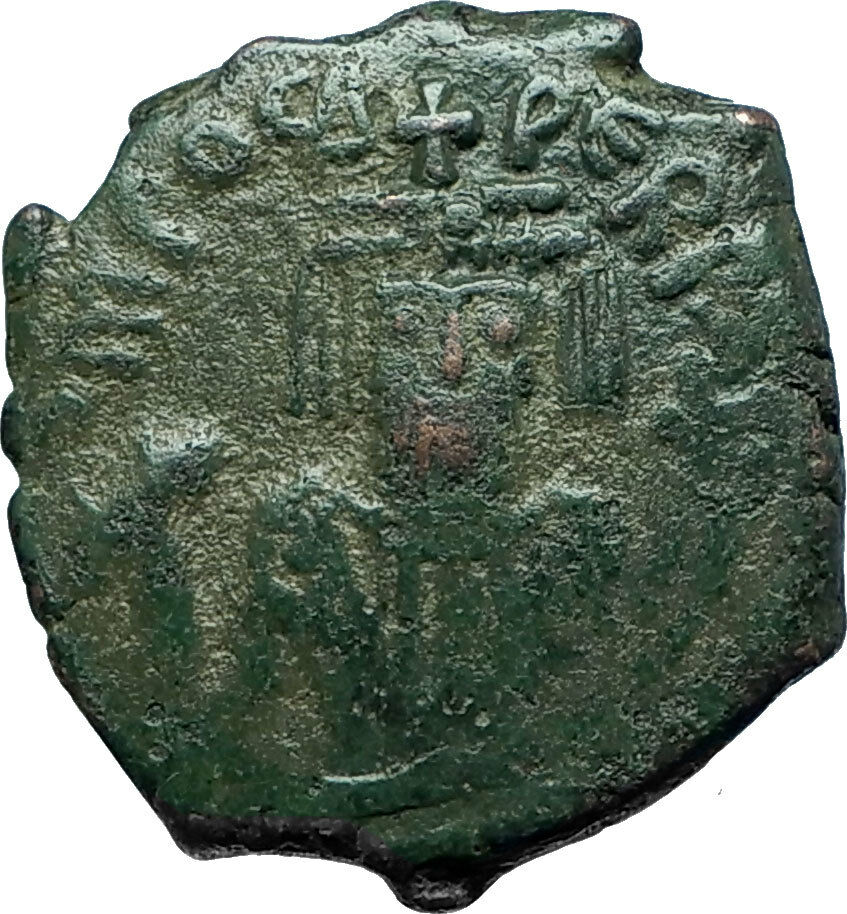|
Byzantine – Justin II & Queen Sophia –
Bronze Half Follis 21mm (5.36 grams) Thessalonica mint: November 15, 565
A.D. – October 5, 578 A.D. Reference: Sear 366
D N IVS- Justin, on left, and Sophia on right, seated facing on double throne,
both nimbate;
he holds globe cross, she holds cruciform scepter.
Large K; above ┼; to left, A / N / N O ; to right, numeral representing regnal
year; beneath, TЄS.
You are bidding on the exact item pictured,
provided with a Certificate of Authenticity and Lifetime Guarantee of
Authenticity.
Flavius Iustinus (Iunior) Augustus
(c. 520 – 5 October 578) was
Eastern Roman emperor
from 565 to 578. He was the nephew of
Justinian
I
, and husband of
Sophia
, the niece of the late empress
Theodora
, and therefore member of the
Justinian Dynasty
. His reign is marked by war with
Persia
and the loss of the greater part of
Italy
.
Reign
When Justinian died on
November
14
, 565
,
Justin was elevated to the imperial throne by a group of court officials
claiming that Justinian had named him as his successor on his deathbed, thus
passing by another possible candidate for imperial succession, a nephew of
Justinian
Germanus
, also called Justin, who was not present in the capital at the time
of the emperor’s death.
In the first few days of his reign Justin paid his uncle’s debts,
administered justice in person, and proclaimed universal religious toleration.
Contrary to his uncle, Justin relied completely on the support of the
aristocratic party.
Proud of character, and faced with an empty treasury, he discontinued
Justinian’s practice of buying off potential enemies. Immediately after his
accession, Justin halted the payment of subsidies to the
Avars
, ending a truce that had existed since 558. After the Avars and the
neighbouring tribe of the
Lombards
had combined to destroy the
Gepids
, from
whom Justin had obtained the Danube fortress of
Sirmium
, Avar
pressure caused the Lombards to migrate West, and in
568 they invaded
Italy
under their
king Alboin
.
They quickly overran the Po valley, and within a few years they had made
themselves masters of nearly the entire country. The Avars themselves crossed
the Danube in 573 or 574, when the empire’s attention was distracted by troubles
on the Persian frontier. They were only placated by the payment of a subsidy of
60,000 silver
pieces by Justin’s successor
Tiberius
.
The North and East frontiers were the main focus of Justin’s attention. In
572 his refusal to pay tribute to the
Persians
in combination with overtures to the Turks led to a war with the
Sassanid Empire. After two disastrous campaigns, in which the Persians overran
Syria
and
captured the strategically important fortress of
Dara, Justin
reportedly lost his mind. The temporary fits of insanity into which he fell
warned him to name a colleague. Passing over his own relatives, he raised, on
the advice of Sophia, the general
Tiberius
to be Caesar in December 574 and withdrew into retirement. In 574,
Sophia paid 45,000 solidi to Chosroes in return for a year’s truce.[2]
Sophia and Tiberius ruled together as joint regents for four years, while Justin
sank into growing
insanity
.
When he died in 578 Tiberius succeeded him as
Tiberius II Constantine
.
Personal traits
The historian Previte-Orton describes Justin as “a rigid man, dazzled by his
predecessor’s glories, to whom fell the task of guiding an exhausted,
ill-defended Empire through a crisis of the first magnitude and a new movement
of peoples”. Previte-Orton continues,
In foreign affairs he took the attitude of the invincible, unbending
Roman, and in the disasters which his lack of realism occasioned, his reason
ultimately gave way. It was foreign powers which he underrated and hoped to
bluff by a lofty inflexibility, for he was well aware of the desperate state
of the finances and the army and of the need to reconcile the
Monophysites
.”[3]
Speech at abdication
The tardy knowledge of his own impotence determined him to lay down the
weight of the diadem; he showed some symptoms of a discerning and even
magnanimous spirit when he addressed his assembly,
“You behold”, said the emperor, “the ensigns of supreme power. You are
about to receive them, not from my hand, but from the hand of God. Honor
them, and from them you will derive honor. Respect the empress your mother:
you are now her son; before, you were her servant. Delight not in blood;
abstain from revenge; avoid those actions by which I have incurred the
public hatred; and consult the experience, rather than the example, of your
predecessor. As a man, I have sinned; as a sinner, even in this life, I have
been severely punished: but these servants, (and we pointed to his
ministers,) who have abused my confidence, and inflamed my passions, will
appear with me before the tribunal of Christ. I have been dazzled by the
splendor of the diadem: be thou wise and modest; remember what you have
been, remember what you are. You see around us your slaves, and your
children: with the authority, assume the tenderness, of a parent. Love your
people like yourself; cultivate the affections, maintain the discipline, of
the army; protect the fortunes of the rich, relieve the necessities of the
poor.”
In silence and in tears, the assembly applauded the counsels, and sympathized
with the repentance of their prince. Tiberius received the diadem on his knees;
and Justin, who in his abdication appeared most worthy to reign, addressed the
new monarch in the following words: “If you consent, I live; if you command, I
die: may the God of heaven and earth infuse into your heart whatever I have
neglected or forgotten.” The four last years of the emperor Justin were passed
in tranquil obscurity: his conscience was no longer tormented by the remembrance
of those duties which he was incapable of discharging; and his choice was
justified by the filial reverence and gratitude of Tiberius.[4]
Justin’s insanity
According to
John of Ephesus
, as Justin II slipped into the unbridled madness of his
final days he was pulled through the palace on a wheeled throne, biting
attendants as he passed. He reportedly ordered organ music to be played
constantly throughout the palace in an attempt to soothe his frenzied mind, and
it was rumoured that his taste for attendants extended as far as devouring a
number of them during his reign.[5]
|








